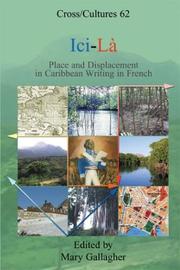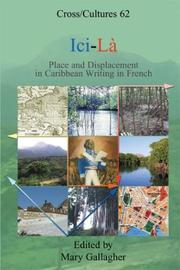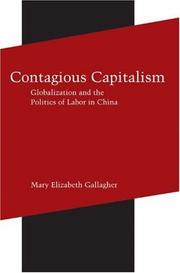| Listing 1 - 10 of 28 | << page >> |
Sort by
|

ISBN: 9042008865 9789042008861 Year: 2003 Volume: 62 Publisher: Amsterdam Rodopi
Abstract | Keywords | Export | Availability | Bookmark
 Loading...
Loading...Choose an application
- Reference Manager
- EndNote
- RefWorks (Direct export to RefWorks)
In Caribbean writing, place is intimately inflected by displacement - place and displacement are not dichotomous; every ‘here’ invariably implies a ‘there’. In line with this extreme imbrication of (dis)location, Caribbean writing in French explores questions of increasing global pertinence such as the relation between writing and displacement, local and distant space, text and place, identity and migration, passage and transformation. Contributions range across genres and the work of writers such as Aimé Césaire, Patrick Chamoiseau, René Dépestre, Édouard Glissant, Émile Ollivier, Gisèle Pineau, Simone Schwarz-Bart and Ernest Pépin. Topics explored include the poetics of dwelling space, the postmodern or postcolonial dynamic of the Creole town, and the textualization of place and displacement. Also included are essays on the drama of distance, the metamorphosis of recent Haitian writing, the literary reverberations of the figure of Toussaint L'Ouverture, and links between Ireland and the French Caribbean.
French literature (outside France) --- Thematology --- Caribbean Area --- Caribbean area

ISSN: 01817779 ISBN: 2070754332 9782070754335 Year: 1998 Volume: 14 Publisher: [Paris] : Gallimard,
Abstract | Keywords | Export | Availability | Bookmark
 Loading...
Loading...Choose an application
- Reference Manager
- EndNote
- RefWorks (Direct export to RefWorks)
Don de Pierre Jodogne
Créolité. --- Perse, Saint-John, --- Style. --- Critique et interprétation.

ISBN: 9780802097477 0802097472 9780802095169 080209516X 144268965X 9781442689657 1442692316 Year: 2008 Publisher: Toronto
Abstract | Keywords | Export | Availability | Bookmark
 Loading...
Loading...Choose an application
- Reference Manager
- EndNote
- RefWorks (Direct export to RefWorks)
Following an introductory chapter by Mary Gallagher, which maps this conceptual terrain, the contributors investigate how globalization inflects the necessary relationship between poetics, culture, ethics, and politics.
Culture and globalization. --- Literature and morals. --- Poetics. --- Politics and literature. --- Literature --- Literature and politics --- Globalization and culture --- Morals and literature --- Poetry --- Political aspects --- Influence --- Moral and ethical aspects --- Technique --- Globalization --- Ethics

ISBN: 9789004486515 9789042008960 Year: 2003 Publisher: Leiden; Boston : BRILL
Abstract | Keywords | Export | Availability | Bookmark
 Loading...
Loading...Choose an application
- Reference Manager
- EndNote
- RefWorks (Direct export to RefWorks)
In Caribbean writing, place is intimately inflected by displacement - place and displacement are not dichotomous; every 'here' invariably implies a 'there'. In line with this extreme imbrication of (dis)location, Caribbean writing in French explores questions of increasing global pertinence such as the relation between writing and displacement, local and distant space, text and place, identity and migration, passage and transformation. Contributions range across genres and the work of writers such as Aimé Césaire, Patrick Chamoiseau, René Dépestre, Édouard Glissant, Émile Ollivier, Gisèle Pineau, Simone Schwarz-Bart and Ernest Pépin. Topics explored include the poetics of dwelling space, the postmodern or postcolonial dynamic of the Creole town, and the textualization of place and displacement. Also included are essays on the drama of distance, the metamorphosis of recent Haitian writing, the literary reverberations of the figure of Toussaint L'Ouverture, and links between Ireland and the French Caribbean.

ISBN: 019815982X Year: 2002 Publisher: Oxford Oxford university press
Abstract | Keywords | Export | Availability | Bookmark
 Loading...
Loading...Choose an application
- Reference Manager
- EndNote
- RefWorks (Direct export to RefWorks)

ISBN: 9042008962 Year: 2003 Publisher: Amsterdam : Rodopi,
Abstract | Keywords | Export | Availability | Bookmark
 Loading...
Loading...Choose an application
- Reference Manager
- EndNote
- RefWorks (Direct export to RefWorks)

ISBN: 9042020393 9789042020399 9401203253 1429456272 9781429456272 Year: 2006 Volume: 285 Publisher: Amsterdam Rodopi
Abstract | Keywords | Export | Availability | Bookmark
 Loading...
Loading...Choose an application
- Reference Manager
- EndNote
- RefWorks (Direct export to RefWorks)
Proposant comme objet commun d'interrogation « le sens et la présence du sujet poétique », tel qu'il se manifeste ou se refuse, dérive ou déborde, s'éprouve ou s'échappe dans la production poétique de la France et du monde francophone depuis 1980, le présent volume réunit un nombre considérable d'études et de réflexions qui, parties de divers postulats, penchants ou postures d'écriture, englobent bien des courants et des clivages dont s'alimentent encore fructueusement aujourd'hui, mais non sans les contester ou les réorienter, poésie et pensée critique. De l'absence à la présence, de la froide objectivation dispositale aux troublants sursauts et silences de l'instance subjective, de la négativité du re-jet à la palpitation difficilement localisable du sub-jet ou du sur-jet, le lecteur est convié à savourer un très large et très riche éventail d'approches qui convergent toutes sur la même problématique en éclairant avec finesse l'étonnante pluralité d'enjeux autour desquels s'articulent la poésie et ses précarités, ses percées, sa haute pertinence.
French poetry --- History and criticism --- Poetry --- French literature --- anno 1980-1989 --- anno 1990-1999 --- anno 2000-2009 --- Poésie française --- Histoire et critique --- French poetry. --- History and criticism. --- French poetry - 20th century - History and criticism

ISBN: 0691117616 0691130361 9786613133366 1400837294 1283133369 9780691130361 9781400837298 9780691117614 Year: 2011 Publisher: Princeton, NJ
Abstract | Keywords | Export | Availability | Bookmark
 Loading...
Loading...Choose an application
- Reference Manager
- EndNote
- RefWorks (Direct export to RefWorks)
One of the core assumptions of recent American foreign policy is that China's post-1978 policy of "reform and openness" will lead to political liberalization. This book challenges that assumption and the general relationship between economic liberalization and democratization. Moreover, it analyzes the effect of foreign direct investment (FDI) liberalization on Chinese labor politics. Market reforms and increased integration with the global economy have brought about unprecedented economic growth and social change in China during the last quarter of a century. Contagious Capitalism contends that FDI liberalization played several roles in the process of China's reforms. First, it placed competitive pressure on the state sector to produce more efficiently, thus necessitating new labor practices. Second, it allowed difficult and politically sensitive labor reforms to be extended to other parts of the economy. Third, it caused a reformulation of one of the key ideological debates of reforming socialism: the relative importance of public industry. China's growing integration with the global economy through FDI led to a new focus of debate--away from the public vs. private industry dichotomy and toward a nationalist concern for the fate of Chinese industry. In comparing China with other Eastern European and Asian economies, two important considerations come into play, the book argues: China's pattern of ownership diversification and China's mode of integration into the global economy. This book relates these two factors to the success of economic change without political liberalization and addresses the way FDI liberalization has affected relations between workers and the ruling Communist Party. Its conclusion: reform and openness in this context resulted in a strengthened Chinese state, a weakened civil society (especially labor), and a delay in political liberalization.
Capitalism --- Globalization --- Investments, Foreign --- Labor --- S10/0251 --- S10/0330 --- S10/0430 --- S10/0641 --- S10/0700 --- S11/0830 --- Capital exports --- Capital imports --- FDI (Foreign direct investment) --- Foreign direct investment --- Foreign investment --- Foreign investments --- International investment --- Offshore investments --- Outward investments --- Capital movements --- Investments --- Economic aspects --- Government policy --- Political aspects --- China: Economics, industry and commerce--General works and economic history: since 1989 --- China: Economics, industry and commerce--Employment --- China: Economics, industry and commerce--Investment --- China: Economics, industry and commerce--Foreign trade and economic relations: since 1989 --- China: Economics, industry and commerce--International economic relations (incl. development aid and problems, WTO) --- China: Social sciences--Labour conditions and trade unions: since 1949 --- China --- Cina --- Kinë --- Cathay --- Chinese National Government --- Chung-kuo kuo min cheng fu --- Republic of China (1912-1949) --- Kuo min cheng fu (China : 1912-1949) --- Chung-hua min kuo (1912-1949) --- Kina (China) --- National Government (1912-1949) --- China (Republic : 1912-1949) --- People's Republic of China --- Chinese People's Republic --- Chung-hua jen min kung ho kuo --- Central People's Government of Communist China --- Chung yang jen min cheng fu --- Chung-hua chung yang jen min kung ho kuo --- Central Government of the People's Republic of China --- Zhonghua Renmin Gongheguo --- Zhong hua ren min gong he guo --- Kitaĭskai︠a︡ Narodnai︠a︡ Respublika --- Činská lidová republika --- RRT --- Republik Rakjat Tiongkok --- KNR --- Kytaĭsʹka Narodna Respublika --- Jumhūriyat al-Ṣīn al-Shaʻbīyah --- RRC --- Kitaĭ --- Kínai Népköztársaság --- Chūka Jinmin Kyōwakoku --- Erets Sin --- Sin --- Sāthāranarat Prachāchon Čhīn --- P.R. China --- PR China --- Chung-kuo --- Zhongguo --- Zhonghuaminguo (1912-1949) --- Zhong guo --- Chine --- République Populaire de Chine --- República Popular China --- Catay --- VR China --- VRChina --- 中國 --- 中国 --- 中华人民共和国 --- Jhongguó --- Bu̇gu̇de Nayiramdaxu Dundadu Arad Ulus --- Bu̇gu̇de Nayiramdaqu Dumdadu Arad Ulus --- Bu̇gd Naĭramdakh Dundad Ard Uls --- Khi︠a︡tad --- Kitad --- Dumdadu Ulus --- Dumdad Uls --- Думдад Улс --- Kitajska --- China (Republic : 1949- ) --- Commercial policy. --- Politics and government --- Investissements étrangers --- Travail --- Capitalisme --- Mondialisation --- Politique gouvernementale --- Aspect économique --- Politique et gouvernement --- Politique commerciale --- PRC --- P.R.C. --- BNKhAU --- БНХАУ --- INVESTISSEMENTS ETRANGERS --- GLOBALISATION --- POLITIQUE ET GOUVERNEMENT --- POLITIQUE COMMERCIALE --- TRAVAIL --- CAPITALISME --- ASPECTS POLITIQUES --- ASPECTS ECONOMIQUES --- CHINE --- POLITIQUE GOUVERNEMENTALE --- 1976 --- -POLITIQUE GOUVERNEMENTALE
Book
ISBN: 3839421284 3837621286 9783837621280 9783839421284 Year: 2016 Publisher: Bielefeld
Abstract | Keywords | Export | Availability | Bookmark
 Loading...
Loading...Choose an application
- Reference Manager
- EndNote
- RefWorks (Direct export to RefWorks)
The charge of »Ressentiment« can in today's world - less from traditionally conservative quarters than from the neo-positivist discourses of particular forms of liberalism - be used to undermine the argumentative credibility of political opponents, dissidents and those who call for greater »justice«. The essays in this volume draw on the broad spectrum of cultural discourse on »Ressentiment«, both in historical and contemporary contexts. Starting with its conceptual genesis, the essays also show contemporary nuances of »Ressentiment« as well as its influence on literary and philosophical discourse in the 20th century.
Resentment. --- Scheler, Max, --- Criticism and interpretation. --- Emotions --- Ethics. --- Literatur. --- Ressentiment. --- Nietzsche, Friedrich Wilhelm, --- Ressentiment im Aufbau der Moralen (Scheler, Max). --- Ressentiment; Envy; Power; Dissent; Criticism; Culture; Literature; Cultural Theory; General Literature Studies; Cultural History; Cultural Studies --- Nietzsche, Friedrich --- Nietzsche, Friederich --- Criticism. --- Cultural History. --- Cultural Studies. --- Cultural Theory. --- Culture. --- Dissent. --- Envy. --- General Literature Studies. --- Literature. --- Power.
Book
ISBN: 1316028623 1316018199 1316028143 110708377X 1107444489 Year: 2017 Publisher: Cambridge : Cambridge University Press,
Abstract | Keywords | Export | Availability | Bookmark
 Loading...
Loading...Choose an application
- Reference Manager
- EndNote
- RefWorks (Direct export to RefWorks)
Can authoritarian regimes use democratic institutions to strengthen and solidify their rule? The Chinese government has legislated some of the most protective workplace laws in the world and opened up the judicial system to adjudicate workplace conflict, emboldening China's workers to use these laws. This book examines these patterns of legal mobilization, showing which workers are likely to avail themselves of these new protections and find them effective. Gallagher finds that workers with high levels of education are far more likely to claim these new rights and be satisfied with the results. However, many others, left disappointed with the large gap between law on the books and law in reality, reject the courtroom for the streets. Using workers' narratives, surveys, and case studies of protests, Gallagher argues that China's half-hearted attempt at rule of law construction undermines the stability of authoritarian rule. New workplace rights fuel workers' rising expectations, but a dysfunctional legal system drives many workers to more extreme options, including strikes, demonstrations and violence.
Labor laws and legislation --- Labor policy --- Employee rights --- Authoritarianism --- Political science --- Authority --- Employees --- Labor rights --- Rights of employees --- Civil rights --- Employee rules --- Law and legislation
| Listing 1 - 10 of 28 | << page >> |
Sort by
|

 Search
Search Feedback
Feedback About UniCat
About UniCat  Help
Help News
News